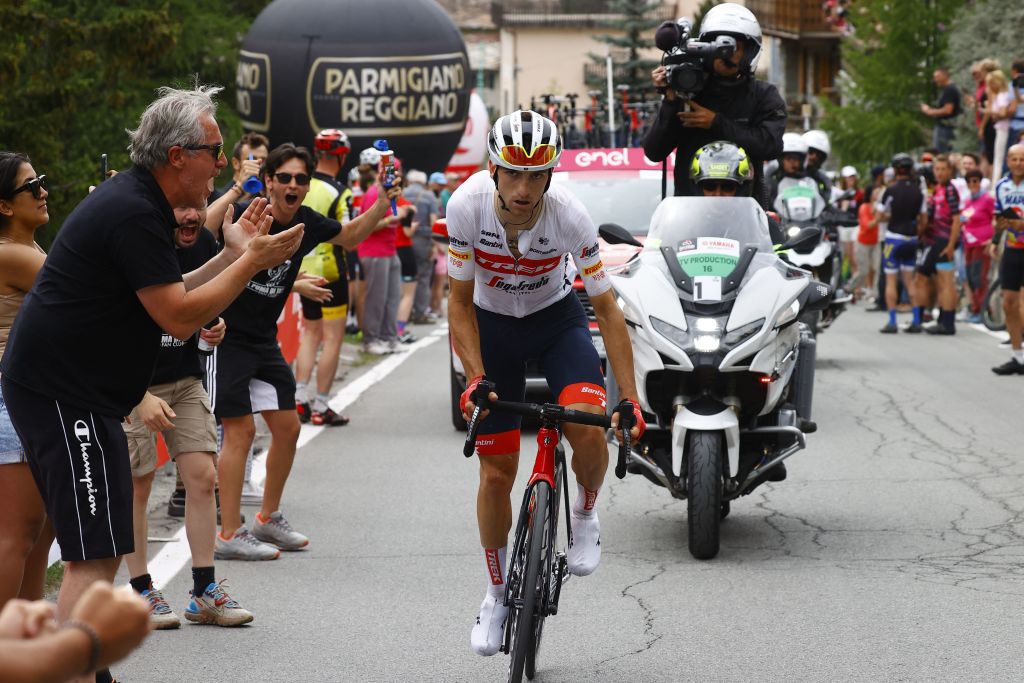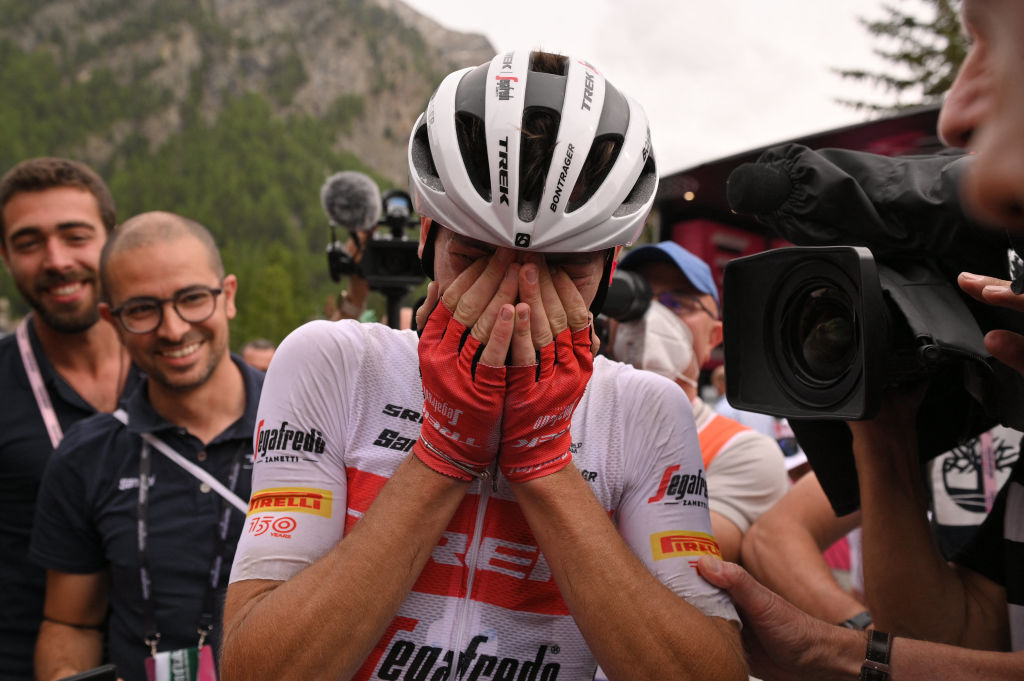A tale of two Sundays as Giulio Ciccone saves Giro d’Italia in Cogne
Italian claims stage victory a week after home disappointment on Blockhaus

“Salve a tutti,” Giulio Ciccone grinned as he took a seat in the press conference truck in Cogne. The world seems an altogether brighter place after victory on the Giro d’Italia. Everybody is a friend.
“It was certainly about time – but more than that it was badly needed,” Ciccone joked about his solo win on the Giro’s first day in the Alps. “This win comes after a long and difficult period, where I was very unlucky. But it’s come…”
Ciccone’s joy in the Valle d’Aosta contrasted sharply with his distress on the Blockhaus on stage 9 a week previously. Born in nearby Chieti, Ciccone knew the final climb better than anybody in the race, but he was unceremoniously deposited out the rear of the pink jersey group on the lower slopes, losing over nine minutes.
His general classification aspirations ended immediately, but the post-mortem lasted a little longer. On the descent to his Trek-Segafredo bus after the stage, a downbeat Ciccone paused for a sombre conclave with a group of equally despondent friends and family.
Illness had hindered Ciccone’s approach to the Giro and his travails did not drop unexpectedly out of the ether. After losing in front of his home crowd, however, he then had to remain in his native Abruzzo for the rest day, feeling as though the time would never pass.
“For me it was a good kicking,” Ciccone said. “It wasn’t a surprise, but when it comes like that, at home on the Blockhaus, and then afterwards there’s a rest day and you’re still there among your people, the feeling is even worse. It was hard for me, but I tried to front up to my capabilities, and stay focused. I was a bit limited by the problems I had before the Giro, but I said sooner or later the chance would come.”
Ciccone’s scope for aggression was limited by his Trek-Segafredo teammates Juan Pedro López’s long tenure in the pint jersey, but an opportunity eventually fell Ciccone’s way on stage 15 to Cogne. After smartly measuring his effort in the break on the category 1 climbs of Pila-Les Fleurs and Verrogne, Ciccone dropped Santiago Buitrago (Bahrain-Victorious) and Hugh Carthy (EF Education-EasyPost) on the steepest portion of the final climb to claim the third Giro stage win of his career after his victories at Sestola in 2016 and in Ponte di Legno in 2019.
Get The Leadout Newsletter
The latest race content, interviews, features, reviews and expert buying guides, direct to your inbox!
“The attacks I made weren’t attacks of desperation, they were simply the attacks Giulio Ciccone makes when he feels good,” said Giulio Ciccone. “I’ve been a target of criticism and of course I accept criticism, but I feel that some of it was exaggerated.”
GC contender

Ciccone’s victory performance has lifted him to 16th place overall, precisely where he finished at this race in 2019. That display, along with his spell in yellow on that year’s Tour de France, was supposed to presage his development into a Grand Tour contender, but Ciccone has been repeatedly beset by illness and ill fortune in the years since.
After COVID-19 ruined his 2020 Giro, he crashed out of last year’s race in the final week, just when he looked set for a place in the top six overall. The scene repeated itself at the Vuelta a España, where Ciccone’s late rise up the standings was ended by another crash.
“Last year was a special year because bad luck conditioned everything,” he said. “At last year’s Giro, I had optimal condition and I was up there with the GC guys on every stage. On stage 17, I was lying fifth or sixth overall and I crashed out. At the Vuelta, we went for GC too, and I crashed out on the same stage, just when I was rising in the standings.
“There’s no point in denying that I’m not in the same category as Pogačar or Roglič, but for me doing a good GC means trying for the top five. This year I wanted to do it, but it all went wrong for me from Tirreno-Adriatico onwards. I got COVID-19 again and then I got bronchitis, so I was two weeks on antibiotics. It ruined my preparation and it meant going for the GC wasn’t possible.”
With Ciccone’s former teammate Vincenzo Nibali set to retire at the end of the season, Italy’s dearth of stage racing talent has been drawn into ever sharper focus. Six years have passed since the home nation last won the Giro, and the country’s overall challenge is again being led by two veterans, namely Nibali (8th at 2:58) and Domenico Pozzovivo (5th at 1:01). Ciccone, now 27, has long been anointed as the next in line, even if he has yet to finish in the top 10 of a Grand Tour.
“I’ve always said that the comparison with Nibali is too strong because we’re two very different riders, in every way. He won everything he could have won, so to be compared to him is a great responsibility,” Ciccone said. “Speaking only of myself, I’m convinced I can be competitive and do a good GC. But there are factors I can’t control. I’ve had a lot of bad luck.”

Barry Ryan was Head of Features at Cyclingnews. He has covered professional cycling since 2010, reporting from the Tour de France, Giro d’Italia and events from Argentina to Japan. His writing has appeared in The Independent, Procycling and Cycling Plus. He is the author of The Ascent: Sean Kelly, Stephen Roche and the Rise of Irish Cycling’s Golden Generation, published by Gill Books.